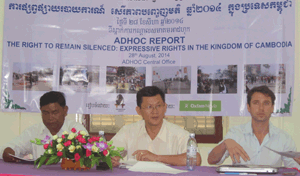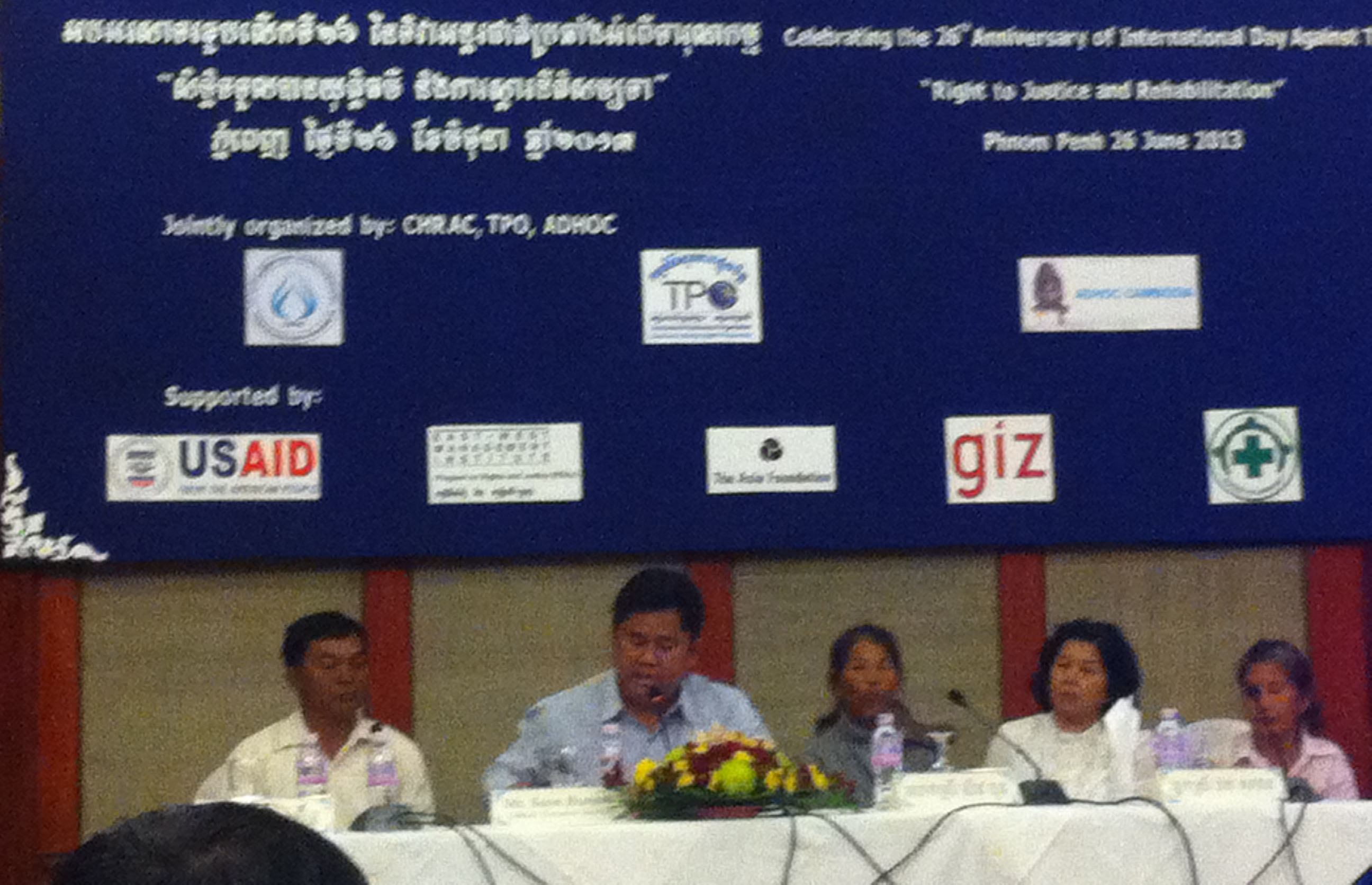The ECCC at a Crossroad:
Making Victim Participation Meaningful ahead of the Second Trial
Civil Society Memo
Phnom Penh, 13 September 2010
 The Extraordinary Chambers in the Courts of Cambodia (ECCC) have broken new ground when they introduced in 2007 Internal Rules which provided for an extensive victim participation scheme. Three years later the Court is at risk to undermine one of its most promising features if it doesn’t show a stronger commitment and more decisive action to acknowledge civil parties and other victims and to assist them in ways that allow for a meaningful participation.
The Extraordinary Chambers in the Courts of Cambodia (ECCC) have broken new ground when they introduced in 2007 Internal Rules which provided for an extensive victim participation scheme. Three years later the Court is at risk to undermine one of its most promising features if it doesn’t show a stronger commitment and more decisive action to acknowledge civil parties and other victims and to assist them in ways that allow for a meaningful participation.The ECCC marked an important milestone when it pronounced its first verdict in the case against Kaing Guek Eav, alias Duch. It was a first visible success for the many Cambodians who followed the event through the media. However, some aspects of the Trial Chamber Judgment disappointed many civil parties and victims of the Khmer Rouge in Cambodia. These reactions demonstrate the need for proactive outreach by the Court, to better prepare victims for future trial proceedings and to assist them with a broader understanding of the judicial process. In addition, the Court has committed to balance the limitations in the civil party process with a more robust mandate to support victims generally through non-judicial measures to be implemented by the Victims Support Section (VSS). To date, no visible progress has been made on this commitment.
With the ECCC’s Judges meeting this week at their Plenary Session, the Cambodian Human Rights Action Committee (CHRAC), the International Federation for Human Right (FIDH) and the Cambodia Justice Initiative (CJI) urge the Court to learn the lessons from the past, to overcome the inadequacy in the current system and to prepare for a meaningful participation of victims and civil parties in the Court’s second and most important trial. In particular, we want to point to three areas where improvement is urgently needed: outreach, reparations and effective assistance through the Victims Support Section.
(1) Improve and extend the outreach to civil parties and other victims!
In its first judgment, the ECCC Trial Chamber did not admit 24 of the 90 civil parties in that case while making the decision only at the time of the verdict – after many of those rejected had participated more than two years in the proceedings. Moreover, the verdict provided specific principles for the admission process which were in such detail never communicated to the applicants before. The same holds true with the orders that are currently issued by the Co-Investigating Judges in relation to the admission of civil party applicants in Case 002. We believe that it would have been appropriate to spell out these criteria early and to communicate them to all potential applicants. No proper guidelines have been provided by the Court at the beginning of the process to make Cambodian applicants understand the basis and the limitations of their participation as civil parties.
Only a more proactive outreach to civil parties can help to rectify some of the past miscommunications, better manage the expectations of those participating in the process and acknowledge their suffering. As a first step, we recommend to the Court to invite in particular all inadmissible civil parties of Case 002, where possible, to the premises of the ECCC. We believe that the most appropriate and respectful way is for them to receive an explanation of their status directly from the Co-Investigating Judges. Such an approach would allow improving the victims’ understanding of the limitations of the legal process and, most importantly, it would be a strong sign of acknowledging their contribution to the Court process. In addition, this format would guarantee that all civil party applicants have at least once seen the ECCC.
(2) Make collective and moral reparations real!
The Trial Chamber’s award of collective reparations added to the disappointment of many of the civil parties joining in the Case 001. The Chamber promised only to publish the names of the victims and to compile a record of Duch’s statements of confession and remorse – a remedy which fell well short of the civil parties’ collective request. Much of the Judges’ decision was due to the strict limitations of the current procedural rules. The reactions of the civil parties now increase the pressure on the Court to change these rules and to provide so more flexibility to make its reparations mandate a reality, at least for the victims in Case 002.
Over the past two ECCC Plenary sessions the rights of civil parties have been drastically curtailed to streamline the victim participation process in order to accommodate a much larger number of participants in the Court’s next case. Though some of these changes were necessary, we now see a responsibility for the Judges of the ECCC to put the same efforts into responding meaningfully to the claims for collective and moral reparations while at the same time referring adequately to the UN Basic Principles on the Right to a Remedy for Victims of Gross Violations of International Human Rights Law and Serious Violations of International Humanitarian Law. Reparations will figure high on the Plenary’s agenda this week, and a consultations process with civil party lawyers and civil society organizations had taken place during the past weeks.
We recognize various constraints on the ECCC to create a process for reparations that is consistent with its mandate, respects the rights of civil parties – as victims of the worst possible crimes – to a remedy and reparation, while at the same time is capable of being realized in practice. Therefore, we strongly urge the Judges of the Plenary to add more flexibility to the Court’s reparations mandate, in particular by looking beyond the individual accused person and considering additional avenues for the implementation of reparations awards. In our opinion, such important amendments would allow the Chambers to consider schemes that more accurately reflect the Court’s commitment to ensuring moral and collective reparations are awarded to civil parties; while at the same time corresponding much more with the wants and needs of the victims. Notably, making recommendations, such as to the State, and endorsing feasible forms of collective reparations would provide the recognition and acknowledgment sought by the victims of the Khmer Rouge. Otherwise, the ECCC risks the potential of a positive legacy with regard to the survivors it is meant to serve.
(3) Empower the Victims Support Section to carry out its full mandate!
Much of our demands depend on a Victims Support Section that functions effectively and plays a leadership role in guiding the process of victim participation at the ECCC. Although the VSS has accomplished a great task in the past months by eventually processing all applications and arranging legal representation to all civil parties, we believe that the Section needs to be empowered further to finally fulfill all parts of its mandate as provided in the Internal Rules. The times of instability caused by changing leaderships must end, and we call upon the ECCC Office of Administration to ensure that the VSS has all the support and the means it needs to assist civil parties and other victims. Ahead of the beginning of the ECCC’s second trial, expected at the beginning of next year, the VSS needs to develop a detailed strategic plan to carry out its expanded mandate, including those provisions in relation to non-judicial measures. Such plan should be developed in consultation with victims, civil parties and their lawyers, and civil society. Finally, we appeal to the German government to continue their earmarked funding to the VSS. This continuous financial support is urgently needed to ensure a positive legacy of the Court vis-à-vis the primary beneficiaries of this process – the victims of the Khmer Rouge.
Summary recommendations:
To all the Court’s Judges at the Plenary
-
Amend the ECCC’s Internal Rules as to provide the Trial Chamber with greater flexibility and additional avenues to award and implement collective and moral reparations for civil parties;
-
To the Co-Investigating Judges: Inform all civil parties about their status and invite, where possible, inadmissible civil parties of Case 002 to the Court in order to explain them, in person, your orders and to acknowledge their contribution to the process;
To the Court administration and the Victims Support Section
-
Ensure the Victim Support Section has adequate support, a stable leadership, sufficient resources and a forward-looking strategic plan to fulfill its mandate of assisting civil parties and other victims;
-
Improve outreach to civil parties and other victims by applying a much more proactive outreach strategy which allows to inform them more adequately, better manages their expectations and provides recognition to their participation;
-
Provide sufficient support to civil party lawyers and the future lead co-lawyers to represent their clients according to their mandate;
-
Begin designing, planning and implementing non-judicial measures for the benefit of victims;
To the donors
· To all the donors: Fulfill the commitments made during the establishment of the ECCC and commit sufficient funds for the ECCC to accomplish its mandate, including towards victims;
· To the German government: Continue to support financially the Victims Support Section and ensure, through the GTZ, that the funding benefits the civil parties and other victims.
|
Signatory
|
Position/Organization
|
Mobile
|
|
|
1
|
Mr. THUN Saray
|
016 440 044
|
|
|
2
|
Mr. HANG Chhaya
|
Executive Director of the Khmer Institute of Democracy (KID)
|
012 865 910
|
|
3
|
Mr. SOK Sam Oeun
|
Executive Director of the Cambodian Defenders’ Project (CDP)
|
012 901 199
|
|
4
|
Ms. Karine BONNEAU
|
Fédération International des ligues des Droits de l’Homme (FIDH)
|
–
|
|
5
|
Mr. RUN Saray
|
Executive Director of Legal Aid of Cambodia (LAC)
|
012 838 341
|
|
6
|
Mr. LONG Panhavuth
|
Program Coordinator, Cambodia Justice Initiative (CJI)
|
012 843 647
|


